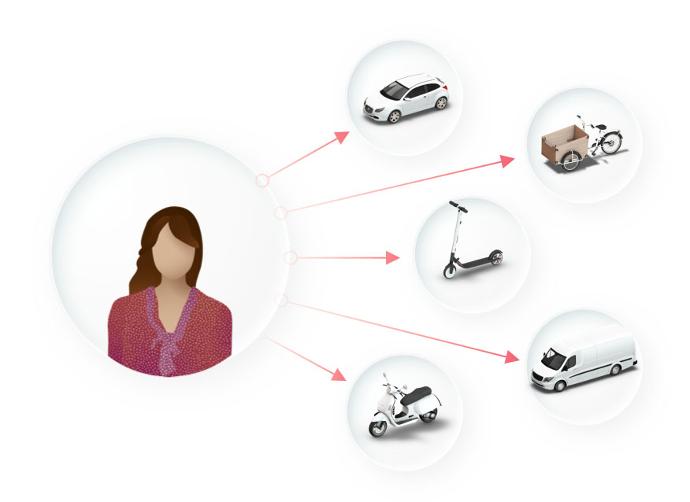"My house, my car, my boat." Who knows that famous German bank advertising slogan from the 90s? In this scene, two old friends meet again after years and now compare who has really achieved something in the meantime. The simple formula to make the conclusion: More possessions equal more success. In 2021, this has changed quite a bit. People from the outspoken Generation Y place less value on possessions than they do on experiences. A life with lots of work and little free time is of no desire. A big car with high fixed costs is of no need. And a house in the countryside? Rather always something new thanks to Airbnb.
Today, owning things is no longer at the top of the list. Ownership entails obligations: If you have a large house, you need time and money to clean and maintain it. If you own a car, you have to take care of inspections, tire changes and repairs. And not to mention the annoying search for a parking space. Sharing frees you from all these chores. While the slogan "Sharing is caring" still aims to share one's own things for the benefit of others, today a shared economy has developed in many areas of life. Sharing not only for charitable reasons, but also to make money. Airbnb is a good example of sharing one's own four walls and the platform is only the facilitator.
There are several models for carsharing as well as platforms that connect car owners with people interested in sharing. But above all, there are providers who build up their own fleets and rent out vehicles by the minute, hour, day and/or kilometer which is a good deal for all sides. The provider earns more money through short-term rental than he pays for the car and this includes fuel and maintenance. The users enjoy individual mobility in the same way as car owners, but pay only a fraction of the price. It has been proven that cars spend more than 90 percent of their time just parked around. This means that car owners pay for something they only use less than 10 percent of the time. Quite bizarre, really.

To the Countryside with Carsharing
In Frankfurt, Nordend-Ost district in late summer, it's Saturday morning. Peter Andreasen has used his smartphone to book an e-car with the sharing provider app, mobileeee. He is planning a short family outing in the countryside. For this trip, the passionate cyclist will need a car - and the S-Bahn to get to the car. That's because the mobileeee vehicles are parked near the airport at the House of Logistics & Mobility. Peter Andreasen is happy to accept the detour, as it saves him having to own a car in the city.
In the center of the Main metropolis, parking spaces are so scarce that some car owners switch to public transportation just so they don't lose their parking space near their apartment. Quite illogical. The people of Frankfurt are mobility savvy and by utilizing carsharing, they save themselves the hassle of looking for a parking space, while still not having to do without the convenience of individual mobility. In Frankfurt and other large cities, major car manufacturers have also recognized carsharing as a business segment. Some providers have fixed stations, while others operate free-floating carsharing, i.e., cars are parked in public parking lots and can be returned within the business area.
Mobileeee relies on a fixed station. There, the e-cars are reconnected to a charging station directly after the trip. Peter Andreasen has reserved one of the electric cars this Saturday morning. Upon arrival, he briefly checks whether it has any major scratches or dents, opens the car via app and gets in. The trip has begun. At the end of the day, he will pay a low double-digit amount for it. A good deal for him - but also for the provider. The money is automatically debited from Peter Andreasen's credit card. In comparing what a car costs in a monthly lease to how much the provider earns per day, the provider certainly generates more money than the car's cost over the course of that month. Of course one must factor in the costs for personnel, maintenance, marketing, etc.
Living in the Countryside Without an Owned Car
A different setting. Conditions in the flat countryside of the far north are different from those in Frankfurt. Many people have their own car, traffic flows smoothly, and finding a parking space is no problem. And yet more and more people want to do without their own car. An owned car costs a lot, sits around most of the time, continuously loses value and is also not good for the environment. Those who don't need a car for their daily commute are starting to think twice about car ownership and even in rural areas. This is especially the case because carsharing services still make individual mobility possible.
Inka Bestermann has also been pondering. She grew up here on the border of Denmark. Having her own car was simply part of life and was never questioned. Now she works just 20 minutes by bike from her home and on her morning and evening bike rides, she can reflect and gather strength in peace. Only sometimes, when she wants to visit friends outside her village of Medelby, she does need a ride. That's why she registered with the Dörpsmobil e-car sharing project. All she had to do was sign a framework agreement with the provider, a listed association, and register on the MOQO app. If she has an excursion on the agenda, Inka Bestermann reserves the Renault Zoe well in advance - and off she goes. The service is affordable. What she pays for a trip depends on the kilometers driven and the duration of the trip.

Shared Mobility on the Path of Growth
Carsharing at fixed stations dates back to the time when there were no smartphones with GPS. You had to get the car keys from a type of safe with an access card and pin. Today, cars can usually be opened and closed via a smartphone app, so providers don't necessarily have to rent private parking spaces and set up stations. However, the old school ways of carsharing had the advantage that the cars are in a central location and are easier to maintain and clean.
There are currently carsharing services in 855 cities across Germany, consisting of a fleet of 26,000 vehicles. The vast majority of vehicles are serviced at the 6,200 fixed stations. Since the beginning of January 2021, a total of 228 providers in Germany have recorded around 2.9 million customers, which is 25.5% more registered authorized drivers than in the previous year. The number of carsharing vehicles has also grown compared to the previous year, albeit moderately. The German Carsharing Association (bcs) has set a target of having a carsharing station every 400 meters in and around city centers. According to the association, one carsharing vehicle replaces 20 cars.
Gunnar Nehrke, managing director of the association, says several million households in Germany already use their private cars so infrequently that carsharing is cheaper for them than buying a new car. This figure will continue to rise as a result of necessary climate protection measures. According to the mobility study "Mobility in Germany," a vehicle is parked 95 percent of the time; expressed in hours, a private vehicle stands around unused for 23 hours a day. This is inefficient for car owners, who pay for something they rarely use and for the cities and communities whose parking spaces are occupied by just one car for 23 hours a day.

Utilize Carsharing and Save Money
The German Federal Environment Agency (Umweltbundesamt, UBA) is promoting carsharing on its website because it benefits the environment and consumers can save money. "If you drive less than 10,000 kilometers a year, carsharing is financially worthwhile," says the UBA. Despite the upward trend, carsharing is still a mobility solution that plays out in a small niche. At the beginning of the year there were fewer than 3 million cars available for sharing opposed to a total stock of 47.7 million passenger cars. But it doesn't have to continue this way - MOQO is working on it. "Our goal is to make mobility as easy to consume as Spotify or Netflix," says co-founder Michael Minis.




